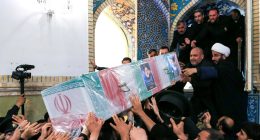
Since 2008, when he first read the memoir Five Years of My Life: An Innocent Man in Guantanamo, Andreas Dresen has been trying to tell author Murat Kurnaz’s story.
Kurnaz, born in Bremen, Germany, to Turkish immigrant parents, was just 19 in December 2001 when, returning home from a trip to Pakistan, he was detained, turned over to American authorities, and, after being accused of being a terrorist and member of al-Qaida, was sent to the Guantanamo Bay detention camp. U.S. and German investigators found no evidence of any terrorist ties, but he remained imprisoned and was tortured and abused, until his release in 2006.
“I couldn’t make it work as a film. I need hope in my films,” says the director of Grill Point (2002), Cloud 9 (2008) and Stopped on Track (2011).
It took years before Dresen found a way in. Instead of telling Kurnaz’s story of capture, torture and injustice — a story told in Stefan Schaller’s 2013 drama Five Years — Dresen would switch the focus to Kurnaz’s mother, Rabiye, whose determined fight to free her son took her all the way to the U.S. Supreme Court.
Rabiye vs. George W. Bush, which premiered in competition at the 2022 Berlinale on Feb. 12, and is being sold worldwide by The Match Factory, is her story. Ahead of the world premiere, Dresen spoke to The Hollywood Reporter about his struggle to make the film, how he found the perfect actress to play the “energetic, incredibly positive and funny” Rabiye, and whether he thinks his film can finally help bring justice for Murat Kurnaz.
You’ve been trying to make a film about Murat Kurnaz for a long time now. How did you finally find a way to approach the story?
I’ve actually been working on this story since 2008. When I read Murat’s book, his story utterly upset me, and I became obsessed with it. I went to Bremen and met with Murat a few times. I tried over several years with three different screenwriters to make a feature film screenplay out of the book. And what can I say? We failed. I couldn’t make it work as a film. I need hope in my films. So you don’t walk out of the cinema completely depressed. [But] I couldn’t find hope in Guantanamo. It’s such a horrible and Kafkaesque situation. The people still there don’t know if they’ll ever get out again.
Maybe it’s just not in me, not my temperament, to tell such a story. Stefan Schaller managed to tell that story quite well, I think [in 2013’s Five Years]. He was able to film at least part of Murat’s book. At one point in my research, I got to know [Murat’s mother] Rabiye over dinner in Bremen with Bernhard Docke, the lawyer who argued Murat’s case. I knew Bernhard already. He helped me establish contact with Murat. Just seeing the two of them together — this vital, energetic, incredibly positive and funny woman and this highly intellectual, principled judicial fanatic — seeing these two people with such different temperaments interacting, I thought: maybe that’s my film.
We started to look at it from their perspective. [Screenwriter] Laila Stieler came in, and the film switched to the mother’s story, to her fight to free Murat.
How did that change in perspective change the way you told the story?
Well, it was a perspective I found easier to get into. Even if you’re not from an immigrant background like Kurnaz, I think every mother or every parent can imagine what it means if you suddenly found out that your son is in Guantanamo. But the key point for me is by changing the perspective, the story becomes one of hope. This woman from a humble background goes out and tries to do the impossible. And she succeeds! She defeats the U.S. president in front of the Supreme Court.
Watching the news, I think we’ve all gotten so used to giving up, that you can’t make a difference anyway. But here is this woman who decides to fight, and she keeps fighting over five years, through a lot of lows. But in the end, she wins. She succeeds. That says to me that there is hope for change. Look at Rabiye.
What’s the relationship like between Rabiye and Bernhard Docke? At first glance, they look like a classic odd couple.
Seeing them together, it’s obvious how much affection, how much love and warmth they have for one another. They are still very close. Bernhard is part of the Kurnaz family. If you want to get in touch with any of them, it all goes through Bernhard. Not just because he’s a lawyer, but because he’s a friend. He went to all her children’s weddings, he’s at all their parties. But you’re right, there is the odd couple dynamic there. That’s part of the humor: how two people from such different backgrounds, such different temperaments, can grow together. You have the very impulsive Rabiye and the very controlled Bernhard. But at certain points in the story, it flips, and it’s the other way around. I also think their relationship adds another positive aspect to what could have been a very difficult and legally complex story. I think people watching will grow fond of these characters, especially Rabiye.
How did you find your lead, Meltem Kaptan, to play Rabiye?
It was actually really difficult to find our Rabiye. We looked all over Germany and Turkey, too, because we needed an actress who spoke both German and Turkish. We didn’t need someone who resembled Rabiye, but her gestures, her way of speaking, needed to be as close to Rabiye as possible. When I first saw Meltem, something clicked. She’s mainly done comedy before. She’s actually a stand-up comedian.
What moved me, right from the start, was not just how professional and talented she is, how great her timing and rhythms are, but how she can open her heart to the audience. You really see that in the film, you peek into this character, see her warmth. It’s her first dramatic role and her first leading role.
How hard was it to balance the serious drama of the story with the lighter moments and the humor?
That was the main balancing act, both during the shoot and in the editing room. I’d say the film is a drama that’s also funny, not the other way around. It’s something we struggled with, because of the seriousness of the story. It was also a challenge just making the movie, because of COVID. We had the same restrictions as everyone else making the movie, but, for me, it was a real struggle because that social interaction — sitting together with the cast and crew after a day’s shoot, partying together — that’s all part of the filmmaking process for me. So I found it very hard not to be able to do that.
And we had international shoots, in Ankara and in Washington, D.C. We were in Washington during the riots on Jan. 6, when it was almost impossible to shoot in the city, or even to walk around with a camera team. We had to go back and shoot those scenes in April last year. Just from a purely technical point of view, it was a struggle to get the film done.
Guantanamo has almost disappeared from the headlines. Why do you think it’s important to tell this story now, to keep telling the story of Guantanamo?
Guantanamo has been around for a good 20 years now. It’s almost 20 years to the day when Murat was taken to Guantanamo. And the prison is still there. There are still 39 people there who have not received a fair trial. It’s a political scandal, to put it mildly. It’s a failure of democracy. In Murat’s case, there were so many failures. Of course, Guantanamo itself shouldn’t exist; it violates every principle of legal jurisprudence and international law. But the behavior of both the German and Turkish governments was deplorable. Basically, no one felt responsible for him, because he was born in Germany as a Turkish citizen. They just passed the bag back and forth. A year after he was arrested, it was clear to everyone involved that he was not guilty, that he hadn’t done anything. But he still spent another three and a half years there, completely innocent. To this day, no one has taken responsibility for that. To date, no one has apologized, let alone paid him compensation. That’s what really pisses me off. Because it’s so absurd.
This film is about a woman who takes it on herself to fight injustice. And we all have to do that. Not just with Guantanamo. We all have to be vigilant when it comes to injustice if we want to maintain our democracy so that something like this doesn’t happen again.
When it comes to Murat Kurnaz and an official apology or compensation, do you expect anything to change now that there’s a new government in Berlin?
If I’m honest? No. But with the film, I think there’ll be a new public discussion on the subject, the press will again reflect on the behavior of the government at the time. Remember, it was a red-green government [a coalition of the left-wing Social Democrats and the Green Party] at the time. Gerhard Schröder was chancellor. It was Angela Merkel who ultimately got Murat released. It was one of her first acts as chancellor, to ask George W. Bush what was going on. And he said: We offered to give him back three years ago, and your government didn’t want him. That’s the truth. Our [current] German president, Frank-Walter Steinmeier, didn’t cover himself in glory either, back then when he was head of the chancellery. But I don’t expect anything to change. I think everyone will try to dodge responsibility or wash their hands of it, as they always have.
Interview edited for length and clarity
Source: HollyWood









